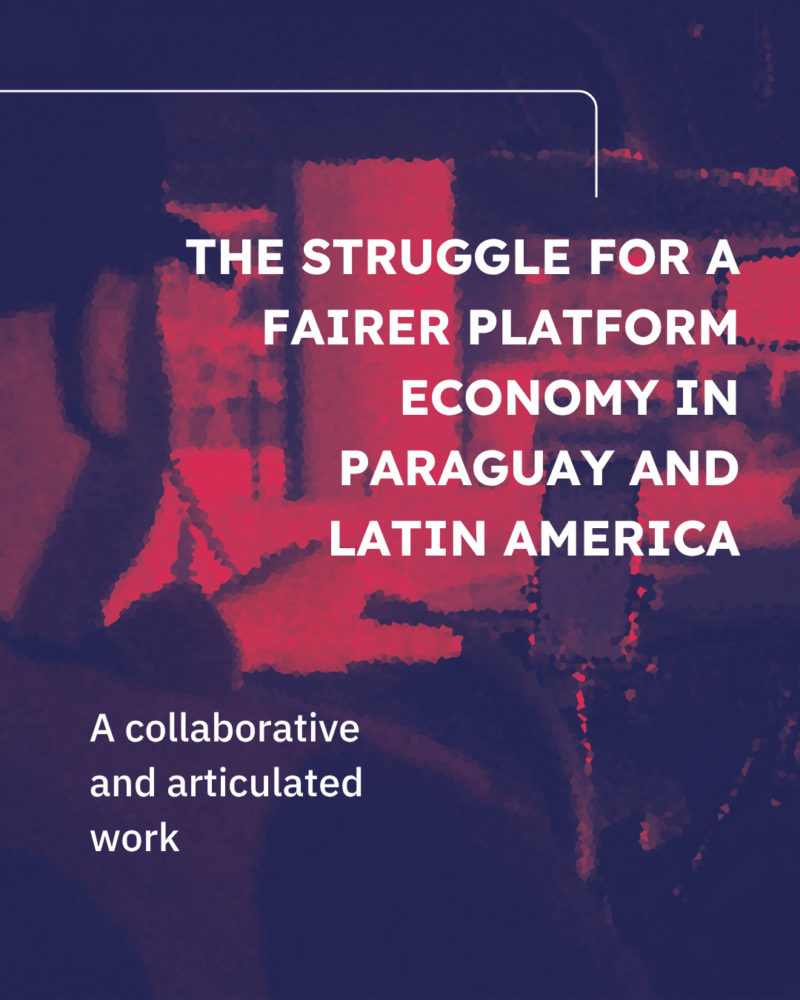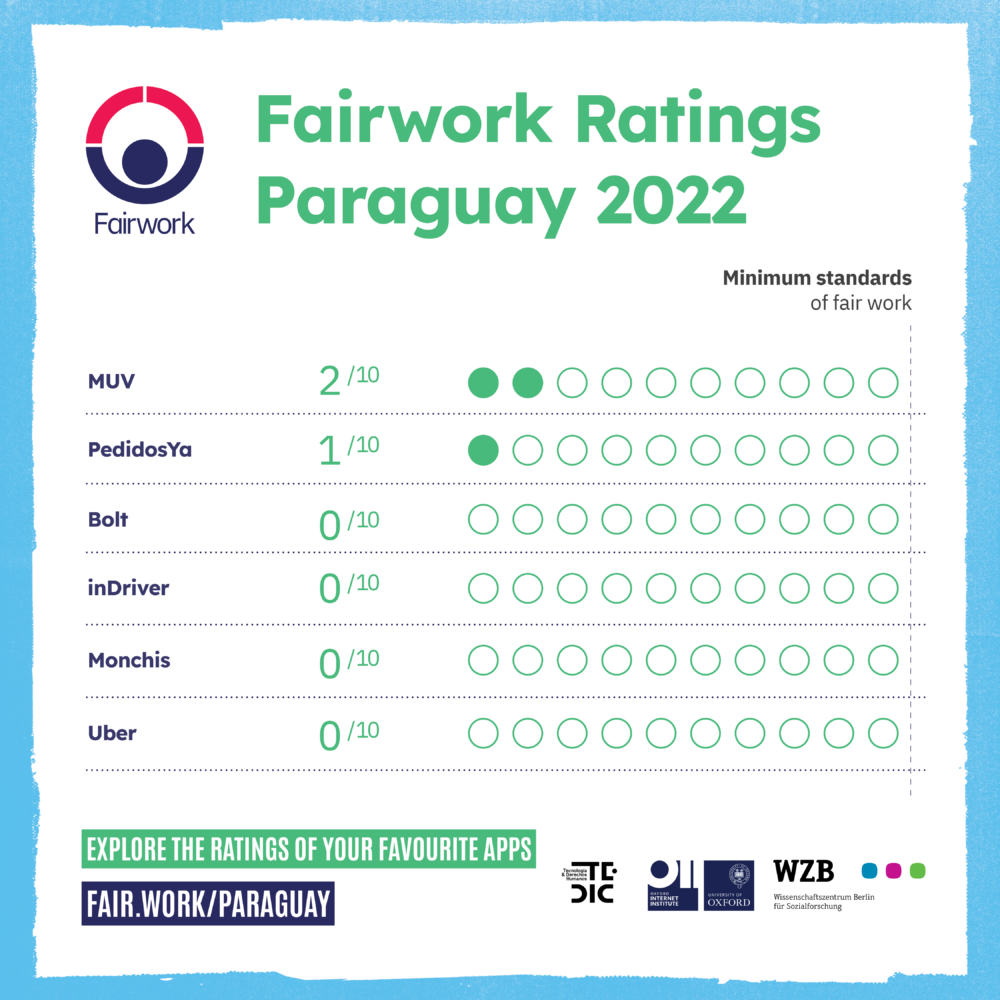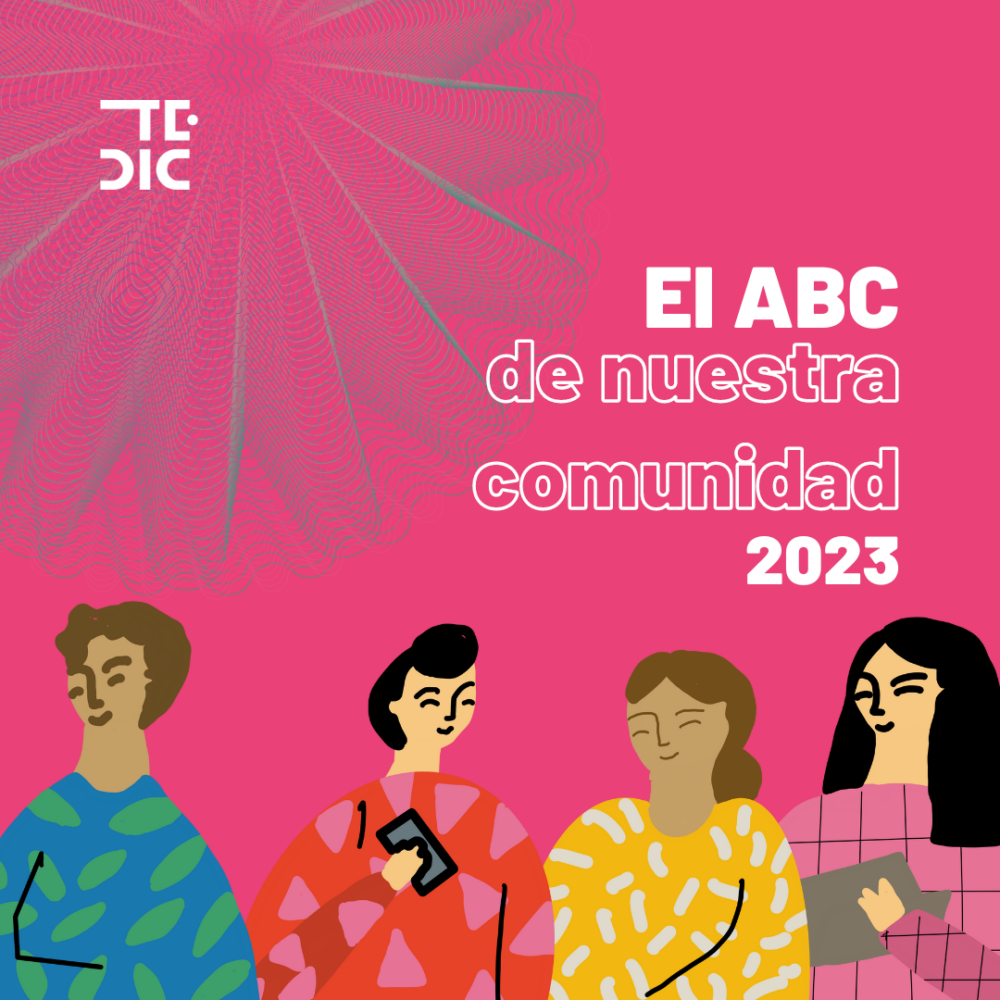
This Monday, June 2, the 113th session of the International Labour Conference officially began. Over the next two weeks, delegates from governments, businesses, and trade unions from the 187 member states of the International Labour Organization (ILO) will meet in Geneva to address a range of issues. Specifically: new international standards on protecting workers from biological risks in the workplace, decent work in the platform economy, and innovative approaches to promote the transition from the informal to the formal economy.
Labour Standards in the Platform Economy in Paraguay
Since 2021, TEDIC has been part of the Fairwork network. This is a research-action project that aims to generate information on how technological changes affect working conditions worldwide, by developing a set of principles to evaluate fair work on these platforms through the Fairwork methodology. Our organization’s membership in this network enabled us to apply the methodology in Paraguay and assess working conditions on digital labour platforms for transport and delivery services, producing the first Fairwork Paraguay ranking. This work helped to highlight a series of precarious conditions within the platform economy, revealing the need for improvements by platforms to ensure fair labour standards for workers.

A collaborative and articulated work
In preparation for the 113th Conference, the ILO shared a questionnaire to gather opinions and responses from its constituents (states, unions, and businesses). Based on the knowledge generated in the Fairwork report, as well as our advocacy in various legislative debates in Paraguay, TEDIC identified the need to contribute to this questionnaire. We formed a strategic alliance with the Central Unitaria de Trabajadores (CUT) and the organized groups of platform workers Kuña Pópe and the Sindicato Nacional de Trabajadores de Moto (SINACTRAM). We completed the questionnaire collaboratively, in cooperation with the International Trade Union Confederation (ITUC) and the International Lawyers Assisting Workers Network (ILAW). Through the questionnaire, we advocated for the 113th Conference to adopt a Convention complemented by a Recommendation. This is crucial because a convention establishes the basic principles that must be applied by ratifying countries, while the recommendation provides more detailed guidelines for implementation.
The Asunción Declaration on Platform Work in Latin America
More recently, we had the honor of hosting the meeting of Fairwork researchers from Latin America. As part of this meeting held in Asunción, we launched—with the presence of trade unions, media, and government representatives—the Asunción Declaration on Platform Work in Latin America. It is worth noting that the Declaration was developed collaboratively with the Fairwork network of researchers in Latin America, building on various studies that applied the Fairwork methodology in Argentina, Brazil, Chile, Colombia, Ecuador, Peru, Paraguay and Uruguay.
The Declaration aims to highlight specific points related to platform work in the Latin American context and to contribute with concrete issues to the discussions to be held at the 113th Conference. It addresses specific topics such as occupational health and safety, algorithmic transparency, effective dispute resolution mechanisms, personal data protection, and the promotion of fair competition.
In the Declaration, we particularly emphasize the need for stronger guarantees in personal data protection and the imperative for ILO regulatory frameworks to support the updating and/or adoption of robust data protection laws, given that regulatory frameworks in this area are still under development in many countries in the region. This is especially important in the Paraguayan context, a country that still lacks comprehensive regulation in this area and recently reached a historic milestone by advancing a data protection bill in the Chamber of Deputies.
The founding signatories of the Declaration included Fairwork, the Platform Observatory of Peru, International Lawyers Assisting Workers (ILAW), Privacy International, Derechos Digitales, the Labour Relations Observatory of the Catholic University of Uruguay, and our organization. Last week marked the deadline for individuals and organizations interested in supporting the Declaration to sign on. We received support from civil society organizations, unions, cooperatives, and worker groups from various parts of the region, including Argentina, Mexico, Costa Rica, Paraguay, Brazil, Colombia, Chile, and Peru. You can access the final list of signatories here.
Joint declaration in support of Standards on Decent Work in the Platform Economy at the International Labor Conference
In addition to the Asunción Declaration, and in support of various global initiatives, we also joined as signatories to a global joint declaration facilitated by Privacy International. The Declaration outlines several points related to the challenges of algorithmic management that result in precarious conditions for platform workers. It also addresses issues of occupational health and safety, personal data, and access to social security. Like the Asunción Declaration, it advocates for the need for a Convention complemented by a Recommendation so that existing international labour standards, protections, and rights apply to all platform workers, regardless of their employment status or whether they are hired through third-party intermediaries, and to address the new threats and gaps created by the platform economy. The full Declaration can be downloaded here.
Moving forward
At TEDIC, we celebrate the inclusion of a point on decent platform work in the framework of the 113th Conference. To ensure that the outcomes of the discussions and negotiations within this space effectively respond to the interests of platform workers, we believe it is essential to promote and sustain a coordinated, solidarity-based, and global effort by civil society organizations, trade unions, workers, academia, and activists involved in platform work issues.
This collective effort is key to safeguarding the rights of those working in the platform economy and to ensuring the enforcement of fair labour standards, long overdue for platform workers.
Finally, as part of the Fairwork network, we are currently in the process of reapplying the Fairwork methodology in Paraguay after a three-year pause. The methodology is also being applied in Argentina, Brazil, Chile, Colombia, Ecuador, Peru, and Uruguay, thanks to the support of the Internet Society. In this way, we remain committed to generating processes that combine research and activism to shed light on the realities that millions of platform workers experience daily in our country and region.

 ABC of our community in 2023
ABC of our community in 2023